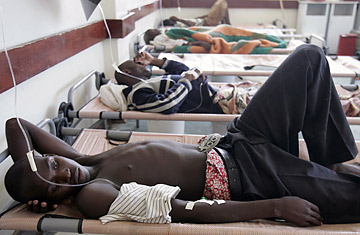
Cholera patients rest on their beds inside the male ward of Budiriro Polyclinic in Harare, December 1, 2008.
Cholera is one of the simplest diseases to prevent or cure. To kill the cholera bacterium in water, just boil it. To treat the chronic diarrhea and potentially fatal dehydration that results from cholera, take a liter of water, a teaspoon of salt, eight teaspoons of sugar, mix, and drink; or, for patients too weak to drink, administer intravenously.
You have to be destitute not to be able to afford a fire. You have to be just as poor not to afford salt and sugar. And you have to have ruinous public sanitation not to be able to filter out the feces of an infected person from the water supply (ingesting fecal matter is the most common way for cholera to spread). So it is a stark indication of how far Zimbabwe has fallen that a country that used to export food is now in the grip of a cholera epidemic that the World Health Organization (WHO) says has claimed 412 lives and infected 9,908 people. South Africa's Sunday Times said 400 new cholera cases were arriving at a treatment center in the township of Budiriro every day. Aid groups on the ground — UNICEF, Medecins Sans Frontieres, German Agro Action and the WHO have between them set up 36 treatment centers — are working on a scenario of 10,000 deaths and 60,000 infected by next March. The outbreak began in the east of the country and now affects the entire eastern portion, said the U.N. Office for the Coordination of Humanitarian Affairs. It is also hitting cities hard, including the capital Harare, where it can be expected to infect more people more rapidly because of greater population density. The epidemic has also spread to neighboring Botswana, South Africa and Mozambique.
The root cause of Zimbabwe's woes is the power struggle between President Robert Mugabe and the opposition Movement for Democratic Change, led by Morgan Tsvangirai. This, by itself, has been bad enough — Mugabe and his security services unleashed a campaign of violence that has killed more than 200 people when they lost control of parliament and Mugabe came second to Tsvangirai in a general election in March this year. (See pictures of the political crisis in Zimbabwe.)
But, in the context of Africa's worst countries, 200 deaths, despotism, brutality and the corruption of the regime elite is all too usual. The cholera epidemic indicates Zimbabwe is entering a new stage: a humanitarian crisis that affects tens of thousands inside the country and, with hundreds of thousands of refugees pouring over Zimbabwe's borders, all southern Africa too. After initially denying there was a problem, Zimbabwe's regime changed its tune last week, saying it could not cope with the health crisis. "With the coming of the rainy season, the situation could get worse," said deputy health minister Edwin Muguti. "Our problems are quite simple. We need to be helped."
